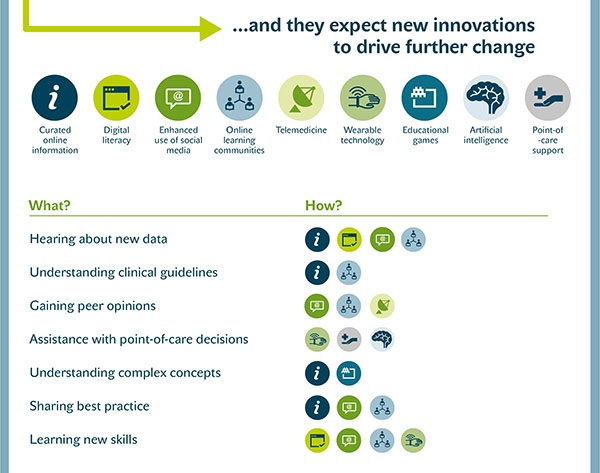Channelling the future in medical education

How will physicians learn and obtain new information 3-5 years from now? What trends and technologies will drive these changes? And what are the implications for those involved in physician engagement and communication? Ten forward-thinking physicians discuss these and other questions in a Medical Education Future Forum.
"Change is the law of life. And those who look only to the past or the present are certain to miss the future." - John F Kennedy
The digital revolution has already led to major changes in channel preferences as mobile technologies, online networks and other innovations provide better ways for healthcare professionals to learn and obtain new information. These changes are likely to continue as the digital skills and sophistication of both patient and physician populations continue to grow. So how can the providers of this information stay ahead?
Understanding and predicting such changes is essential if we are to design future education tools that physicians value and use, and that genuinely support improved patient care. To this end, 10 forward-thinking, digitally literate physicians were brought together to do just that in a forum1 moderated by Dr Bertalan Meskó2.
"Medical education must finally step up to meet the expectations of empowered patients, the needs of busy physicians, and the use of disruptive technologies. This forum was designed to facilitate this process," explained Dr Meskó.
A number of trends and technologies with potential to shape the future of medical education were addressed. These included: curated online information, digital literacy, enhanced use of social media, online learning communities, telemedicine, wearable technology, educational games, artificial intelligence and point-of-care support.
Different trends are predicted to have value in addressing different educational needs. For example, curated online information, digital literacy, social media and online communities will help physicians hear about new data, whereas wearable technology, point-of-care support and artificial intelligence will help physicians make point-of-care decisions.
A section from the full infographic
Click to view the full infographic, which summarises some broad highlights from the Forum. The physicians predict significant changes over the next five years. These include: that essential information and alerts will increasingly be received automatically (vs having to search), that there will be more collaborative learning and greater integration of technology with medical education.
They also predict that digital literacy will be an increasingly important skill for physicians. This is largely due to the challenges of keeping up-to-date with a huge volume of complex, rapidly-changing information and the need to find what is most important, when their time is very limited.
"The physicians predict greater integration of technology with medical education"
To help address these challenges, the physicians increasingly use social and professional networks (including Twitter) plus other technologies and tools to help filter and deliver the information that is most relevant. As these tools develop, doctors can be more confident that important information will reach them. This means they can access the information at times of their choosing – often for short periods in the midst of a busy day.
Healthcare professionals need to be provided with information that is concise, well designed, accessible, and delivered through the right channels to fit with their busy workflows. As healthcare professionals increasingly adopt new approaches and technologies to manage their information needs, so those involved in engaging and educating them must continually sharpen their multichannel skills.
References
1The Ashfield Medical Education Future Forum, designed and sponsored by Ashfield Healthcare Communications, in collaboration with technology platform partner Within3.
2Medical futurist, author of The Guide to the Future of Medicine, medical doctor and founder of webicina.com
About the author:
Ruth Herman is Business Development Director at Ashfield Healthcare Communications. Her role involves enhancing medical communications through innovative use of new technologies to meet the real-world needs of healthcare professionals and their patients. She brings over 20 years' experience of working with many of the world's major healthcare companies to design and implement medical communication programmes that address the challenges faced by Pharma and by healthcare professionals. Ruth led the design and implementation of the Ashfield Medical Education Future Forum. She can be contacted at ruth.herman@ashfieldhealthcare.com and tweets about trends in medical communications at @ruthherman
Ashfield Healthcare Communications is the global leader in multichannel medical education, healthcare communications and PR, delivering scientific content to relevant audiences via their preferred channels.
Have your say: What do you think the key trends for the future will be?
Read more on relationships with doctors:
Is pharma ready to disclose its payments to doctors in Europe?












